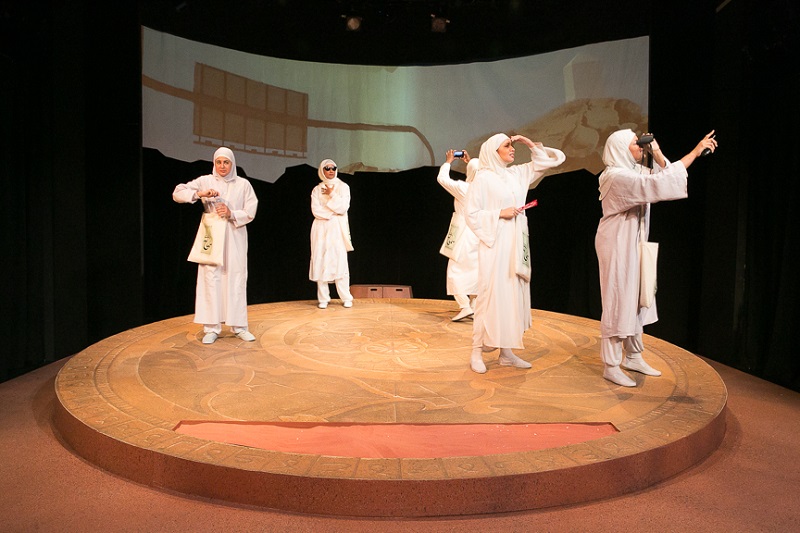
The Hajj, the pilgrimage of Muslims to Mecca, is the largest yearly gathering of people in the world, attracting two to three million pilgrims. A pillar of Islam, the Hajj provides the setting and structure for Rohina Malik's The Mecca Tales, which premiered in Chicago in 2015 and is now making its debut in New York. Its tales are those of five women whose progress along the road to Mecca also marks their difficult progress towards self-determination.
The women whose physical, emotional, and spiritual journeys we follow compose a travel group led by Grace (Kimberly S. Fairbanks), the group's New York-based organizer and guide. She mentions that the government of Saudi Arabia requires pilgrims to be part of a travel group, and she has dedicated the last decade of her life to this work. (The 2017 pilgrimage tote bags that the women sport early on are both a nice touch and an eloquent comment on the political and commercial encroachment on a religious tradition.) The group, composed otherwise of first-timers, is made up of women from diverse backgrounds. Grace is an African-American woman whose conversion to Islam prior to 9/11 was met with familial disapproval. Maya (Mariam Habib) is a war refugee from an unspecified Middle-Eastern country (it is tempting to assume Syria); Malika (Jade Radford) is an African-American med student from a single-parent household; Alma (Cynthia Bastidas) hails originally from Argentina and is married to a British husband; and Bina (Gulshan Mia) is a well-off housewife and mother of Pakistani ethnicity, married to a successful Pakistani neurosurgeon. Each of these travelers has her own reason for joining the pilgrimage, and each, including Grace, also has attendant impediments that she must overcomes and leave behind. That, due to overcrowding, their bus is prevented by police from proceeding to the tents that they paid to stay in symbolizes the challenges that will face them in breaking free of what hinders them, but it also leads to a question that is central to the play as a whole: why did you come here?
As we get to know these women, part of the answer for each to that question comes in often tragic flashbacks, which include some doubling by the cast, as well as multiple appearances by a mysterious woman (and perhaps a conceptual nod to Chaucerian forebearers). Maya, as a refugee and single parent, fights to make ends meet, while Alma's attachment to her own child (and, thus, her husband) is troubled. Malika studies medicine because it is her father's dream that she become a doctor, not her own, and Grace has suffered the consequences of her son's battle with drug abuse. Bina's problem, daughters who are artists and not lawyers or doctors and who wish to marry for love rather than status, seems more humorous than the others, and her melodramatic flashback lives up to that expectation, but she also reveals real, humanizing damage at the heart of her domestic life. It is significant, in fact, that these women's misfortunes all stem from specific males, representing patriarchal structures more broadly, that they share and work through them while any male relatives who made the trip are segregated on their own bus, and that their surviving children are all themselves female.
This multivalent narrative unspools on a terrific set designed by David Esler, featuring an intricately decorated circular stage augmented by images projected on a curved area at the rear. Fairbanks graces that stage (pun sheepishly intended) with a performance that exudes a strength and resolve that must paradoxically be set aside to render it more than defensive. Mia imbues Bina's comic elitism with compelling complexity, embodying her with lots of great, small, unspoken character moments. Bastidas and Habib bring effective pathos to Alma and Maya's experiences, and Radford adds a winning enthusiasm to Malika's. Finally, it would be an easy mistake to overlook the skill necessary for Louis Sallan, who plays every male in the play in their brief appearances, to successfully delineate each as a clear, distinct character.
The Mecca Tales is an earnest drama that rests its overarching optimism on an individual humanism (facilitated, in the climax of play, by a community of women). With its heterogenous characters, it also works against any monolithic notion of Muslim womanhood. Malik's foregrounding of underrepresented voices enriches the tapestry of contemporary American theater. - Leah Richards and John Ziegler
